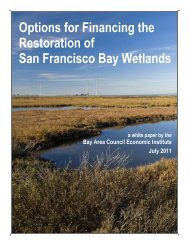Ties That Bind - Bay Area Council Economic Institute
Ties That Bind - Bay Area Council Economic Institute
Ties That Bind - Bay Area Council Economic Institute
You also want an ePaper? Increase the reach of your titles
YUMPU automatically turns print PDFs into web optimized ePapers that Google loves.
Investment: Building Global Businesses in a New China<br />
This interest in investing abroad by U.S. venture capital firms represents a sea change for an industry<br />
that has historically invested all of its money domestically.<br />
Investors see particular upside potential in the fact that many of China’s traditional industry<br />
sectors are highly decentralized with no distinct industry leader. For example, Shanghai Baosteel<br />
Group, a conglomerate formed in 1998 from 11 iron and steel companies, is the world’s 6th<br />
largest steel producer, yet it holds only a 7% market share among China’s 134 steel companies.<br />
This is in part the result of Maoist Cold War security policy to disperse steel production<br />
throughout the country in case of attack. Poor highway and transportation infrastructure,<br />
balkanized regional and local political interests, and local preferences have contributed to a<br />
similar fragmention of China’s consumer market, leading to regional markets and products without<br />
national reach. This can also pose challenges for foreign investors seeking to operate at a<br />
national scale.<br />
Still, the scale and growth of China’s market is stimulating deal flows, reflected in growing M&A<br />
activity. Draft rules issued for comment in May 2006 by the China Securities Regulatory Commission,<br />
which oversees the Shanghai and Shenzhen stock exchanges, propose to reinstate IPOs<br />
for listed companies, allowing them to convert their non-tradable shares so they can use their<br />
own equity for mergers and acquisitions. As of late September 2006, 1,169 of the 1,343 listed<br />
companies on the two exchanges had started or completed plans to make their previously nontradable<br />
shares publicly tradable. These plans have typically involved combining various classes<br />
of non-tradable and restricted shares, along with government-guaranteed issues to compensate<br />
existing domestic shareholders for potential dilution of their interests, into a single, tradable class<br />
of stock known as “G” shares.<br />
So far, the combining of share classes has eroded G share values. Listed companies have tended<br />
to trade at very high multiples at the time of an IPO and then decline in value as earnings and<br />
fundamentals becomes more apparent. Internal management and accounting reforms and reporting<br />
transparency are proceeding, but slowly. Add in exchange rate concerns, and investor<br />
reticence continues to limit trading on the Shanghai and Shenzhen exchanges. A successful ICBC<br />
listing on the Hong Kong and Shanghai exchanges, however, is expected to provide a jump start<br />
for new Chinese listings.<br />
It should be noted that, despite its market economy elements, much of what happens in China<br />
is still administratively determined by the government, introducing a factor of political as well as<br />
commercial risk for foreign investors. Less than a year after issuing clarified rules encouraging<br />
private equity and venture capital investment to go forward, Chinese regulators have imposed<br />
new measures to re-exert partial control. In the telecommunications/internet sector, where<br />
direct foreign ownership is tightly restricted, the Ministry of Information Industry (MII) adopted<br />
rules in July 2006 to more closely regulate contractual relationships between foreign-owned offshore<br />
entities known as special purpose vehicles (SPVs) which hold specific technology, trademarks<br />
and domain names, and the “Restricted Companies” that actually provide those services<br />
under Chinese telecom licenses. In September 2006 the Ministry of Commerce and three agencies<br />
overseeing state-controlled assets and securities transactions adopted tighter controls on<br />
share swaps where a foreign entity acquires a domestic company for eventual overseas<br />
107








